SEC/S16-W5: With the flavor and taste of my country
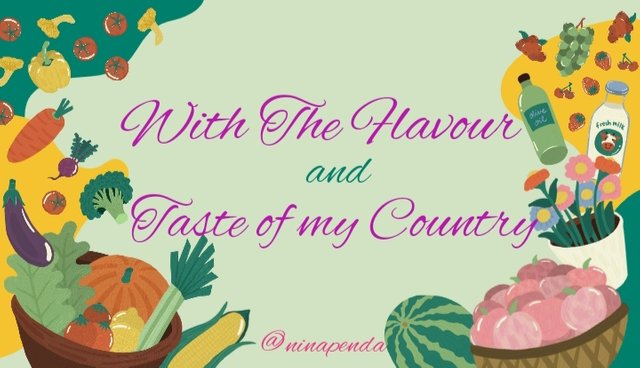 a screenshot from canva a screenshot from canva |
|---|
I come from Nigeria, where there are lots of farm produce like tubers, millet, grains, plantains, guinea corn, corn, and lots more... We have the most consumed farm produce in Nigeria, maize which can be used to make a variety of dishes like tuwo, pap, amala, and corn flour for baking. There are other farm products that are used to make a variety of dishes.
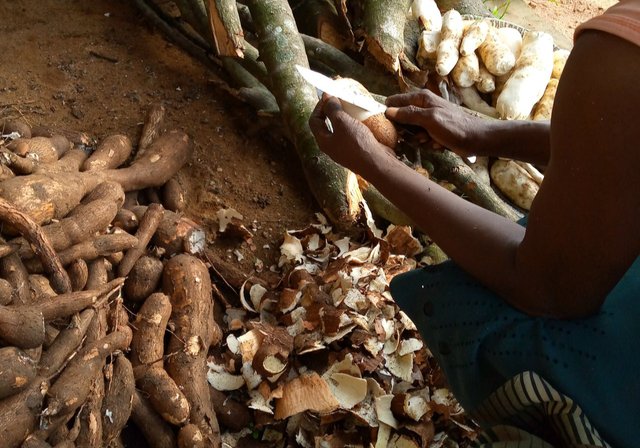 raw cassava raw cassava |
|---|
We have cassava. Cassava is a root vegetable that people eat worldwide. It is a good source of dietary fiber as well as vitamin C, folic acid, manganese, and potassium. A lot of dishes can be made from cassava. We have eba (garri), fufu (akpu), abacha (African salad), tapioca, cassava flour, amala, and lots more...
Note; Cassava is poisonous unless you peel and cook it first.
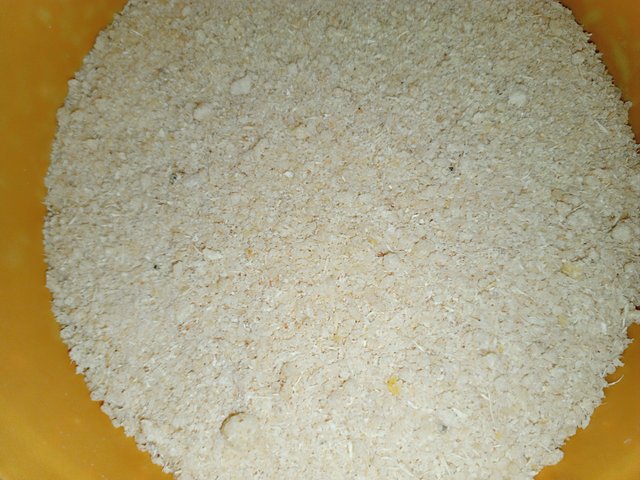 yellow garri yellow garri |
|---|
Eba (Garri) is a dish made from granulated cassava. It is commonly found in West Africa, and there are two types: white and yellow. Normally, garri comes in a white color, but some people prefer the yellow, which is added with oil when frying to give it the yellow color.
The flavor depends on how long it's been fermented and the presence of palm oil. Garri can be soaked and drunk with sugar, milk, and groundnut or coconut; it can also be prepared with hot water and eaten with any kind of soup. Garri is the most popular food found in Igboland.
 wrapped fufu wrapped fufu |
|---|
Fufu (Akpu) is a West African staple made from cassava roots. It is cooked or soaked for a period of time to soften and then pounded to achieve a meal called fufu. It is a swallow with a neutral taste that is served with different types of soups.
Unlike eba, fufu is commonly wrapped in balls of different shapes. We don't have two types of fufu, it is just one color, which is white. Occasionally, fufu is best served, as people prefer fufu to eba. If you have a taste of nice fufu, I bet you will enjoy it.
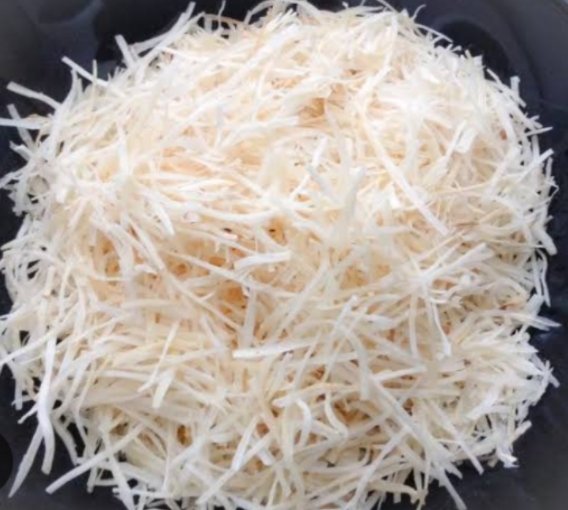 dried african salad dried african salad | 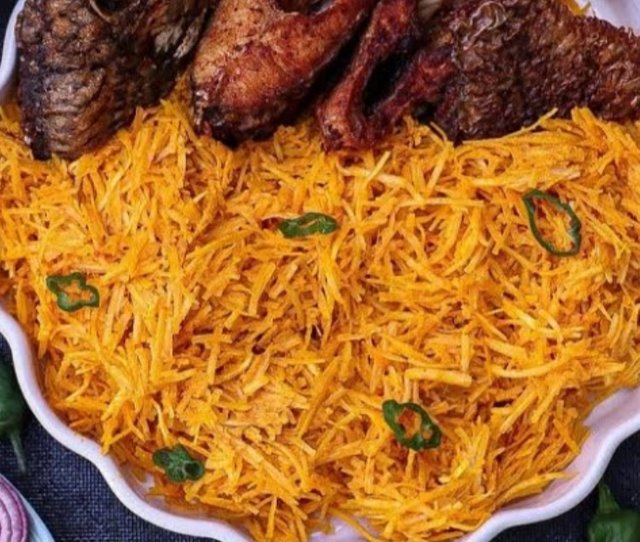 prepared africa salad prepared africa salad |
|---|
African salad (abacha) is a popular West African food among the Igbos. African salad is a nutritional diet that contains potassium, sodium, calcium, magnesium, iron, phosphorus, and zinc. It is also rich in protein.
A lot of processes are involved during the preparation of this meal, and it costs so much because there are lots of ingredients involved to get it done, including fish or meat, palm wine or juice, garden eggs, etc...
It is best served as kola to a visitor, especially an August visitor. On occasions, it is prepared and served to dignitaries because it is a very costly food that can't reach everyone present.
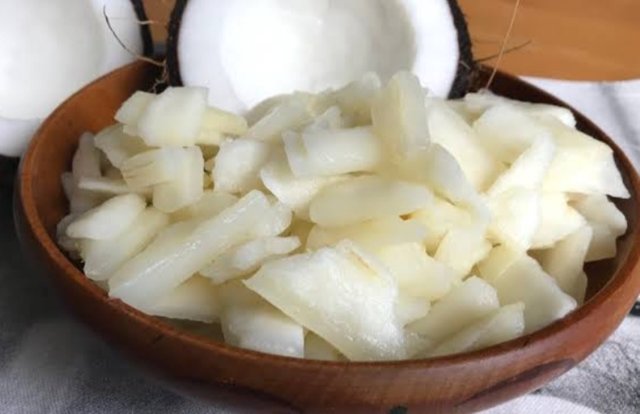 tapioca with coconut tapioca with coconut |
|---|
Tapioca (abacha mmiri) is a common food in West Africa, produced from cassava. It is very easy to prepare. Remember, you can't eat cassava without cooking; the same is applicable to tapioca. You cook and slice, or slice and cook, then soak for a day or two before it can be eaten.
It is served with coconut or ground nuts. And believe me, this meal is great and heavy after eating. It is not so popular, but only during the harvest season.
There are still lots of foods that can be produced from cassava. Cassava is a strong and important farm product in my country. All these foods are produced right here in my country. Just have an amount of cassava and get various foods done.
Harvest season in my country started last month, and a lot of farm produce, including cassava, has been used to make other foods. I am so proud to be a Nigerian, if not for nothing, but for the food luxury we enjoy here.
Note; all these foods and more are gotten from cassava.
I invite @mariami @nancy0 @eliany

It's interesting to find out about the abundant range of meals made from cassava in Nigeria. From garri to fufu, African salad to pudding each recipe supplies a distinct cooking experience. The harvest period should be a busy time loaded with scrumptious developments. Pleased to commemorate Nigeria's food society! 🌽 🍲
Your post is very interesting friend, I see that in your country cassava is very important in dishes, the great thing is that this root is full of nutrients and a lot of flavor.
Successes in the challenge and blessings
Thank you so much
Your post has been successfully curated by @chant at 35%.
Thanks for setting your post to 25% for @null.
We invite you to continue publishing quality content. In this way, you could have the option of being selected in the weekly Top of our curation team.
Thank you ma
Upvoted. Thank You for sending some of your rewards to @null. It will make Steem stronger.
Holaa sra @ninapenda😊 que bonita participación el maíz también se da en mi país y la yuca también pero no es venenosa en ningún momento menos la🤗 suerte 🍀 bye.
Thank you
Nice one, you have really written about cassava.
As the main food in Nigeria, cassava is being used in different ways, as you have mentioned they are really much more than what you have mentioned. For example in my own States we have more than 4 other different ways in addition to what you mentioned that we Cook our Cassava.
Asa iwa
Otor iwa
Nyan ekpang
Akara iwa
Any way I wish you success
Yes ma'am if I was to mention all the processed food from cassava, they are too much. I only mentioned these few. As for the ones you mentioned, I don't know them but I'm sure they taste nice because your people sure knows how to prepare delicious meal.
Thank you ma.
Hahahaha yes we have varieties, a Nigerian without knowing cassava is like a car without a fuel
Hello dear @ninapenda hope you are having a good day.Wow Nigeria's farm produce is amazing. It's cool to read about all the different dishes made from cassava like eba, fufu, and African salad. I bet they're delicious.Thanks for sharing about the food culture in your country ,wish you success 💖🤗🌸💐🌺.
Hello friend your country has alots of cassava production and other varieties of things in Nigeria .I can see your country is bless with alots of food.I remembered my last visit in Nigeria Anambra state I ate a lot of yams and even bought some to my home country .
@ninapenda From the versatile maize to the staple cassava each ingredient offers a rich culinary experience. Your passion for Nigerian cuisine shines through showcasing the diverse dishes and flavors unique to your country. Best of luck